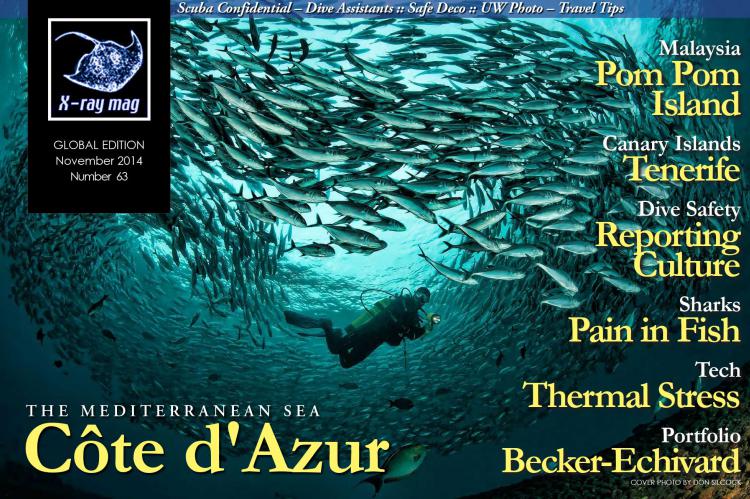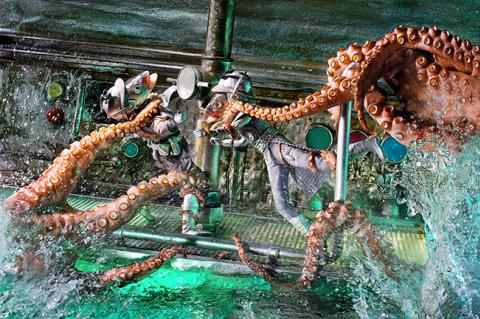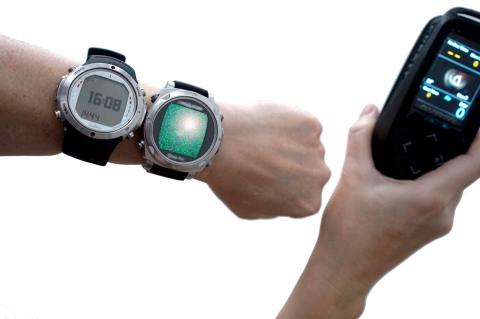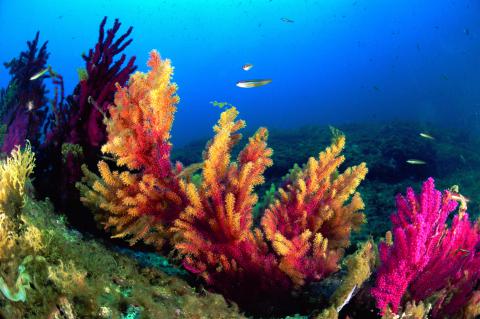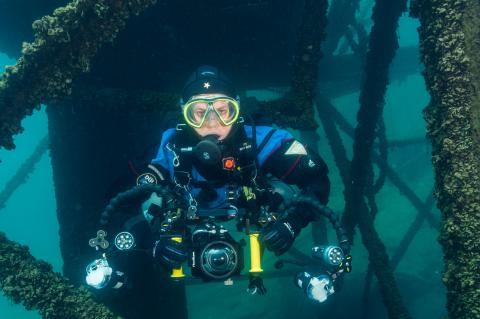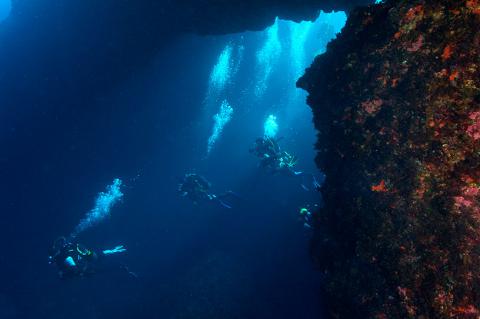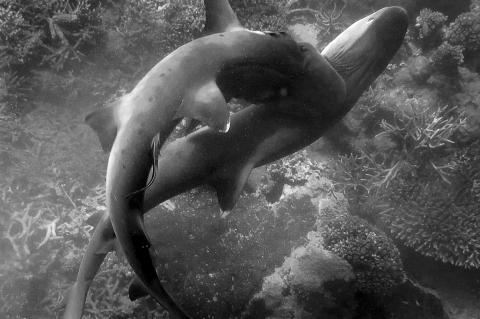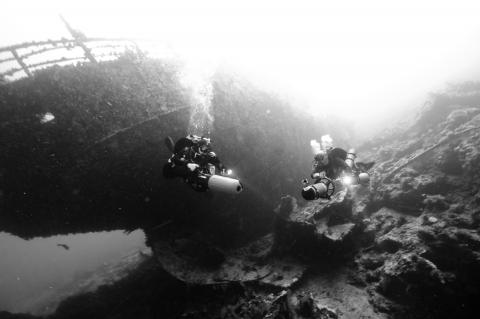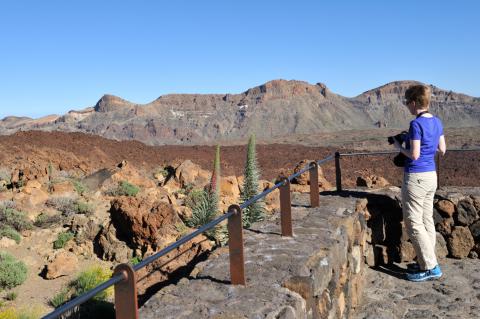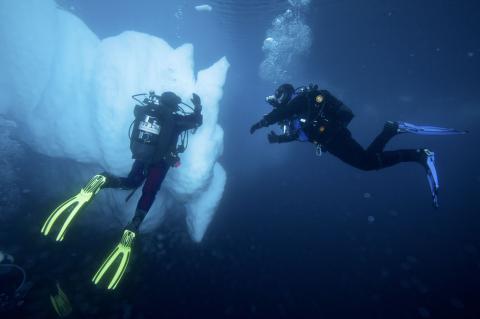X-Ray Mag #63
Diving the French Mediterranean's Côte d'Azur, Tenerife, the Canary Islands; Do Fish Feel Pain?; Denmarks First Artificial Reef; The Physiology of Thermal Stress and How to Stay Warm; 10km on Rebreather; Reporting Culture; Scuba Confidential: Help I Need Somone; Underwater Photography: Have Camera, Will Travel; Profile and Portfolio: Becker-Echivard; Plus news and discoveries, equipment and training news, books and media, underwater photo and video equipment, shark tales, whale tales and much more...
Main features in this issue include:
10km on a Rebreather
On August 14 in Dahab this year, our team of three divers dived a distance of 10km in eight hours using rebreathers. The purpose of this experiment was a practical test of human capabilities and the performance of rebreathers on a long dive, while under the influence of physical activity.
It was in autumn 2010 that my colleague, Sergey Gorpinyuk, proposed the original idea to me: to dive a distance of 7km. As to a location for the experiment, we chose the colorful Mexican cenotes (caves) because they have long passages, calm current and stable direction.
Anne-Catherine Becker-Echivard Portfolio
Merging humanity and animality in art is a device that can be traced back to the bestiary art and stories of the Medieval era, a time when mythical beasts combining animal and human characteristics were born and locked into our collective consciousness.1 French artist Anne-Catherine Becker-Echivard‘s surreal artworks give us hints of these undercurrents, as she creates meticulously detailed dioramas of humanity using actual fish heads for face
"My pictures convey light or serious comedy. While they are entertaining, they also make us think, and even if the compositions are not real, they are always reflecting humor through the fish’s world." — Anne-Catherine Becker-Echivard
But I can't be bent
One might be forgiven for assuming that as a certified diver, one would understand the science and common-sense behind the basic guidelines governing our approach to decompression stress. After all, a good part of a diver’s initial training (and, hopefully, much of the curriculum for more complex programs), explained the vagaries of breathing compressed gas underwater.
The issue with diving—at least for this discussion—is that as a diver descends in the water column, he or she has no option but to breathe compressed gas. Because of this, the inert gas contained in whatever is being breathed is stored in the diver’s body.
Côte d'Azur
Coming full circle. It all started in the Med. It was here in the 1930’s and 40’s that the likes of Hans Hass, Jacques-Yves Cousteau, Frederic Dumas and Phillip Tailliez pioneered scuba diving as we came to know it. Erstwhile the obvious choice for dive travelers once the Red Sea and even more exotic destinations became accessible to a wider audience, it fell somewhat out of favor.
Wind the clock back to 1937, and we will find a young man from Austria by the name of Hans Hass spending his holiday after graduating from high school in the little town of Juan-les-Pins on the French Riviera.
Dealing with the Aftermath
— Post Traumatic Stress Disorder in Recreational Dive Rescuers
On a dive boat everything is going well and all are having a good time. Suddenly a shout for help is heard from the port side. Looking over, a pair of divers is seen and one appears to be unconscious.
Have Camera, Will Travel
Anyone who has been on an airplane in the last five years knows the number of bags and weight limits keeps dwindling. This is very problematic for the traveling photographer. Add scuba gear and housings and the problem multiplies.
I have been an Olympus DSLR user for many years. I continued to use the Olympus E-620 after the camera was discontinued and the system was no longer supported.
Help! I Need Somebody
— The Value of Assistants in Dive Operations
After the dive, the instructor again took care of everything, including handing out drinks and snacks and driving the students back to their hotel.
Pain in Fish & Sharks
It was Dr Lynne Sneddon, at the University of Liverpool, who proved scientifically that fish feel pain and suffer. Her team found 58 receptors located on the faces and heads of trout that responded to harmful stimuli. They resembled those found in other vertebrates, including humans. A detailed map was created of pain receptors in fishes' mouths and all over their bodies.
The relief of the fishes' symptoms by the pain reliever showed the interconnection between the nociceptors, which sense the tissue damage, and the central nervous system, which recorded the damage as pain. Here was proof that fish are aware of tissue damage as pain.
Pom Pom Island
Borneo is the third largest island in the world. It is the home to three countries—Indonesia to the south, Brunei and Malaysia in the north. The Malaysian states of Sabah and Sarawak are located on the island. Our journey to Pom Pom Island took us to the Tawau airport in the state of Sabah. This was a two hour and 40 minute flight. We then had to take a van another hour to the port city of Semporna.
Prior to the journey, my partner, Olga Torrey, and I were invited to do presentations at the Asia Dive Conference (ADCON) in Kuala Lumpur Malaysia and dive at Pom Pom Island with the Celebes Beach Resort. This would be the perfect trip to see how my new camera system would perform.
Reporting culture
“…The real reasons people don’t provide a higher level of detail are two fold: privacy and legal culpability” was the response recently when I posted a blog (http://cognitasresearch.wordpress.com/2014/08/26/the-devil-is-in-the-det...) about the need to collect more detail when looking at diving incidents so that the community, the agencies and academia c
We need to be able to raise the awareness and knowledge of those involved in the sport so that they can truly take responsibility for their own actions.
Tenerife
Most of us in Europe know of Tenerife, but many in North America won’t have heard of it. It’s one of those sunshine locations that isn’t too long a European flight for warmth, sun and reliable weather—easy to reach with economy airlines from many United Kingdom and European airports. It’s the largest of the Canary Islands, part of Spain, but off the coast of Africa on the same longitude as Western Sahara and Morocco.
I first dived in Tenerife in January 1998 and have been back diving a few times. It has over 300 days a year of sunshine, with a summer that’s not too hot and a warmish winter, which brings in the tourists—while the diving plus point is all-year-round diving, with very few days blown out.
Thermal stress
Thermal issues affect the comfort, performance and decompression stress experienced by divers. The impact varies with the timing, direction and magnitude of the thermal stress. Thermal protection can be provided by a variety of passive and active systems. Active systems should be used with particular care since they can markedly alter inert gas exchange and decompression risk.
Increased decompression stress will be experienced by divers remaining warm during descent and bottom phases and cool or cold during ascent and stop phases.
To Travel or Not To Travel...
For most of us, in order to see some of the best dive locations in the world we have to leave home and travel great distances by car, airplane or boat.
In all honesty, there is always something happening somewhere in the world that may give us pause in our travel planning and the fear, real or imagined, of bumping into it should not drive us into a locked room in our basement.


